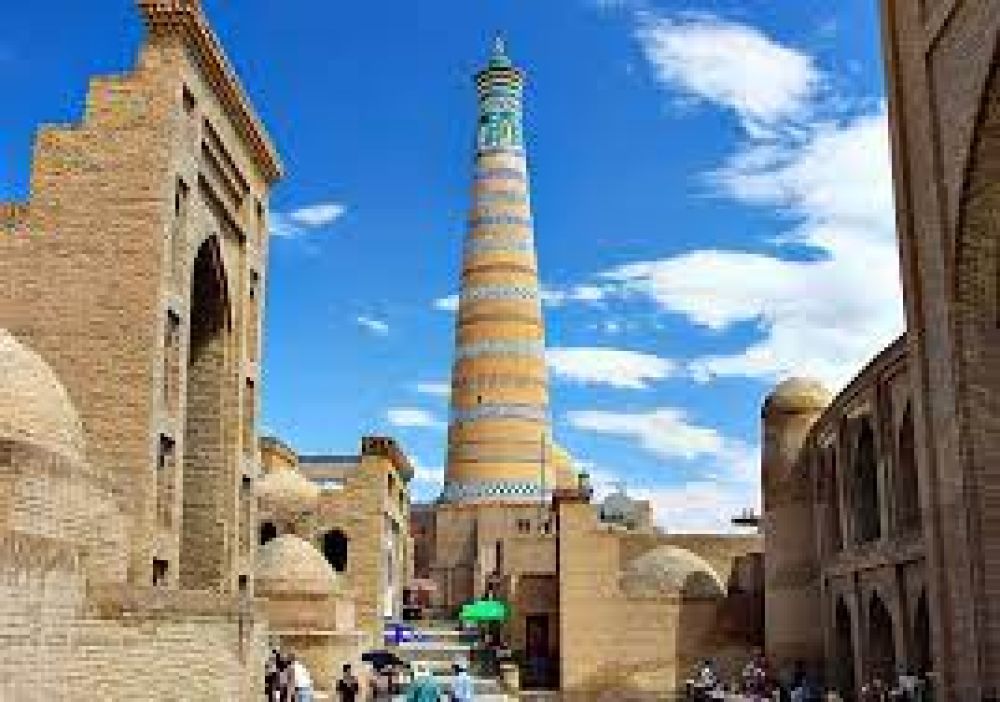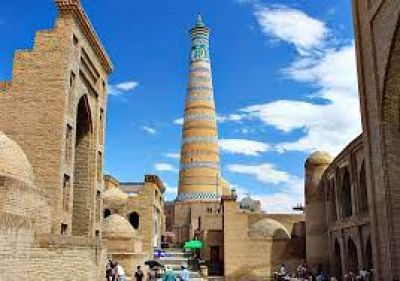

Delve into the history of Khiva with a guided tour of the Islam Khoja complex, which includes the soaring minaret and the madrasah that holds rich educational heritage. As the highest minaret in Khiva, the Islam Khoja Minaret offers an incomparable view over the city's distinctive skyline, with a panorama that stretches to the deserts beyond. While inside the madrasah, you can explore the labyrinth of rooms that once housed students and now feature a range of handicrafts and exhibits depicting life in traditional Central Asia. Your expert guide will regale you with tales of Khiva's past rulers, architects, and scholars, offering insights into the spiritual and cultural significance of the site. The madrasah's courtyard, with its intricate tilework and grand iwan entrances, is a serene place to reflect on the learning that once took place within these walls.
For the adventurous, climbing the narrow, spiraling staircase of the Islam Khoja Minaret is a must-do activity. Standing at about 45 meters tall, the ascent to the top of the minaret is both exhilarating and slightly challenging. Once at the top, climbers are rewarded with stunning views of the ancient city, the Itchan Kala fortress, and the oasis that surrounds Khiva. This activity is a unique opportunity to stand where muezzins have called to prayer and to take in the city from a bird's-eye perspective. Please note that the climb is not suitable for those with mobility issues or a fear of heights, and it is advised to dress conservatively and comfortably for the ascent.
As the sun sets over Khiva, the skyline is transformed into a canvas of soft pastel hues, with the Islam Khoja Minaret silhouetted against the amber sky. Professional and amateur photographers alike will find this the perfect time to capture the historic essence of the ancient city. Whether taking photos from the base of the minaret or from the nearby rooftops, the interplay of light and shadow makes for dramatic and memorable images. Bring your camera and capture memories that meld the history with the fleeting beauty of dusk. It's recommended to arrive early to scout the perfect spot and check the angles for the ultimate sunset shoot.
The madrasah of Islam Khoja has been repurposed into a series of workshops where local artisans practice their crafts. Visitors can wander from room to room, observing craftsmen at work and learning about traditional skills such as wood carving, metalworking, and miniature painting. Each workshop offers a unique insight into the cultural traditions of Uzbekistan, and visitors can watch as intricate patterns and designs take shape. There's also the opportunity to purchase handmade souvenirs, from exquisite jewelry to ornately decorated ceramics, directly from the artisans. Participate in a workshop and try your hand at some of the crafts for an interactive and thoroughly cultural experience.
Occasionally, the courtyard of the Islam Khoja Madrasah becomes a stage for vibrant cultural performances. These events are a feast for the senses, featuring traditional Uzbek music, dance, and sometimes, theatre. The performances showcase regional costumes, musical instruments, and folk traditions, offering a glimpse into the living culture of Khiva. The haunting melodies of the dombra, the rhythmic tapping of doira drums, and the graceful movements of the dancers are set against the backdrop of the madrasah's stunning architecture. Audience members will be captivated by tales and tunes that have echoed through the ages in this historic setting.
As evening falls, the fortress city of Itchan Kala, within which the Islam Khoja complex is situated, takes on a magical aura. A night walk around its high adobe walls and time-worn buildings, now illuminated by soft lighting, is an otherworldly experience. Marvel at the way the ancient structures are lit up against the night sky, enveloping visitors in the romance of the Silk Road. The Islam Khoja Minaret itself becomes a beacon shining light over the city, calling to the curious and the reflective. This quiet walk allows for a more personal connection with the city's millennial past, away from the daytime crowds.
Experience spiritual calm with a sunrise yoga session in the serene courtyard of the Islam Khoja Madrasah. Participants can spread out their mats in the enclosed space, surrounded by the beautiful geometric patterns of the tiles and the soft first light of the day. An instructor will guide you through a series of poses designed to align body, mind, and spirit amidst this historic setting—a rare opportunity to combine personal wellbeing with the tranquility of a centuries-old spiritual center. Suitable for all levels of experience, this is a chance to start the day with peace and introspection.
This activity combines a historical exploration of the Islam Khoja Madrasah with the traditional flavors of Uzbek tea culture. A knowledgeable guide will lead you through the site's varied history and architectural highlights while explaining the role of tea in Uzbek society. After exploring the madrasah, you’ll be treated to a tasting session featuring different types of local teas accompanied by regional pastries and sweets. Learn how to brew tea the Uzbek way and enjoy tales that accompany the tea-drinking tradition in this part of the world. It’s a relaxing way to immerse yourself in local culture and to interact with fellow travelers.
The art of calligraphy, a highly valued skill in Islamic culture, is yours to learn at the madrasah’s calligraphy workshop. Under the guidance of a local master, learn the basics of how to form the elegant strokes of Arabic script—a language historically significant in Islamic education and art. The workshop also provides context about the importance of calligraphy in preserving knowledge and beautifying manuscripts and architecture. All materials are provided, and you'll have the chance to create a piece of work to take home as a unique memento of your visit to Khiva.
Gain insight into the rich textile heritage of Uzbekistan with a visit to the madrasah's exhibition on traditional fabrics and costumes. The display showcases handwoven silk and cotton garments, including the vibrant colors and patterns characteristic of Uzbekistan's national dress. Alongside attire, the exhibition includes examples of intricate embroidery, carpet-making, and suzani—an embroidered tribal textile. Historical context is provided to explain the significance of these textiles in Uzbek culture and trade. Visitors leave with a newfound appreciation for the skill and labor that goes into creating these beautiful works of art.
